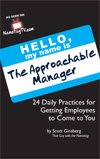 There’s no reason to be mean.
There’s no reason to be mean.
Slinging hate, slashing tires, undercutting pricing and poaching customers is not the smartest way approach your competition.
HERE’S MY SUGGESTION: Out heart the competition.
It’s easier.
It’s cheaper.
It’s more fun.
Here’s how to make it work for your organization: 1. Give your brand three dimensions. Cooking websites are getting smarter. They know that their users don’t just want recipes. They also want to learn what others thought about the recipe, what ingredients they added, what spices they used, what side they paired it with, what wine goes with it and what their families thought about it.
In short: They want to become better cooks, not just better at following directions. And if you want people to join you, know this: Information is price of admission. Giving people a bunch of facts isn’t enough.
To out heart the competition, you have to offer people context, perspective and community. Public radio is another brand that does this beautifully: They speak straight to the heart of the human experience. They explore new angles most stations miss. And they create a safe place to learn that broadens the listener’s cultural sensibilities. You can’t get that from top forty stations.
The point is: Customers want to listen to the whole song. And if all you’re giving them is a few random notes, they’re going to go somewhere else. How many dimensions does your brand deliver?
2. You can’t work incognito. If facts worked, the gym would be crowded. But it’s not. And here’s why: Numbers don’t inspire commitment – story does. And if you don’t dress your truth in it, you’ll never out heart the competition.
Here are the two questions that matter:
*Are you telling a better, funnier, more spreadable and more emotional story than the competition?
*As is that story embedded into every nook and cranny of your brand’s existence?
If not, your product is just a commodity. Another annoying interruption that’s going to be forgotten anyway. Look: You don’t need public speaking lessons – you need to cut your soul open. And you need to express yourself from that place relentlessly and expressively.
Even if it scares you. Even if it scares others. Because you intentionally set out to make the viewer blink, you incidentally end up making the viewer buy.
Remember: Don’t be afraid to chose a better story. Shout it from the rooftops or risk being ignored. Does your work evoke an active resonance or a dull thud?
3. Speak to the heart of human experience. Here’s why Starbucks rocks: They understand that “home” isn’t just the house you live in – it’s the space you return everyday. Sure, they don’t know what’s going on in your life when you walk in the door.
But their store still provides you with an act of escape in a moment of chaos. It’s a daily refuge for people. And that’s ten times more addictive than the caffeine.
Unfortunately, that’s where most companies lose: They fail to recognize and affirm our shared humanity. But if you want to out heart the competition, you have to master that deeper humanity within your work. And then you have to embed it into your job function on a daily basis. Consider these examples:
First, virus protection software. Their job is to preserve the inalienable right of digital freedom. Second, insurance companies. Their job is to help people live their lives free from fear every day. Third, trade associations: They job is to create a network of human healing. Has your brand anchored itself in the concrete foundation of compassion?
4. Anchor belonging. Every quarter, my mastermind group gathers for a full day strategy session. We give feedback to each other, laugh at each other, share with each other and confide in each other. It’s a beautiful thing. And any time new members join us, we always make sure they feel like they’re part of the group immediately.
In fact, I recently received an email from one woman who said, “This was the first group meeting I attended where nobody squeezed my shoulder.”
That’s a great reminder for anyone organization who has a membership base: People don’t want to have their head patted and told they’re going to make it someday. They just want to belong. They just want to have a home. They just want to feel like they’re part of the club.
Try this: Instead of waiting to warm up to people, skip the small talk. Stop inquiring about the goddamn traffic and just jump right in. And instead of asking people what their job title says – ask them what their emotional labor is dedicated to. They’ll forget all about the fact that they’re a first-timer. What do you see when you see people?
5. Squash complacency. Relationships work when you work at them. Period. Otherwise they degrade into predictable, boring and complacent stalemates. And that’s when people start to feel invisible. If you want to avoid getting lazy with your customers, ask one crucial question: How do you recognize longtime partners in a unique, memorable and spreadable way?
And I’m not talking about thoughtless, uninspiring holiday cards that get trashed instantly. Or impersonal, emotionless autoresponders reminding people how important their business is to you.
This is about creating an emotional connection that deepens over time. Gifting – not just giving – meaningful rewards that recognize outstanding contributions to your organization.
That’s why my company makes brandtags. These customized limited edition art pieces, or “identity collages,” completely erase the memory of any other gift your clients have ever received.
With a brandtag, you make people feel essential. With a brandtag, you make gratitude palpable and recurrent. And with a brandtag, you prove that recognition isn’t some corporate initiative – it’s a constitutional ingredient.
Remember: Ingratitude is the gateway drug to complacency. And complacency the merit badge you get for winning a marathon in your comfort zone. How do you thank people?
REMEMBER: People buy from people, not from faceless conformist hierarchies.
Follow the path of heart.
Wear it on your sleeve.
And let it bleed for the people who matter most.
LET ME ASK YA THIS…
Will you out heart the competition?
LET ME SUGGEST THIS…
For a list called, “20 Types of Value You Must Deliver,” send an email to me, and you win the list for free!
* * * *
Scott Ginsberg
That Guy with the Nametag
Author, Speaker, Publisher, Artist, Mentor
[email protected]
 “I usually refuse to pay for mentoring. But after Scott’s first brain rental session, the fact that I had paid something to be working with him left my mind – as far as I was concerned, the value of that (and subsequent) exchange of wisdom and knowledge, far outweighed any payment.”
“I usually refuse to pay for mentoring. But after Scott’s first brain rental session, the fact that I had paid something to be working with him left my mind – as far as I was concerned, the value of that (and subsequent) exchange of wisdom and knowledge, far outweighed any payment.”
–Gilly Johnson The Australian Mentoring Center
Rent Scott’s Brain today!

 Being remembered has less to do with you, and more to do with how people experience themselves in relation to you.
Being remembered has less to do with you, and more to do with how people experience themselves in relation to you. “I usually refuse to pay for mentoring. But after Scott’s first brain rental session, the fact that I had paid something to be working with him left my mind – as far as I was concerned, the value of that (and subsequent) exchange of wisdom and knowledge, far outweighed any payment.”
“I usually refuse to pay for mentoring. But after Scott’s first brain rental session, the fact that I had paid something to be working with him left my mind – as far as I was concerned, the value of that (and subsequent) exchange of wisdom and knowledge, far outweighed any payment.” When I was in college, my roommate and I started a band.
When I was in college, my roommate and I started a band. 
 Being human is good for business.
Being human is good for business.  Congratulations. You remember names. You celebrate birthdays. You memorize preferences.
Congratulations. You remember names. You celebrate birthdays. You memorize preferences. Yes, making someone feel “important” and “valued” and “needed” is a HUGE part of being an approachable leader.
Yes, making someone feel “important” and “valued” and “needed” is a HUGE part of being an approachable leader.